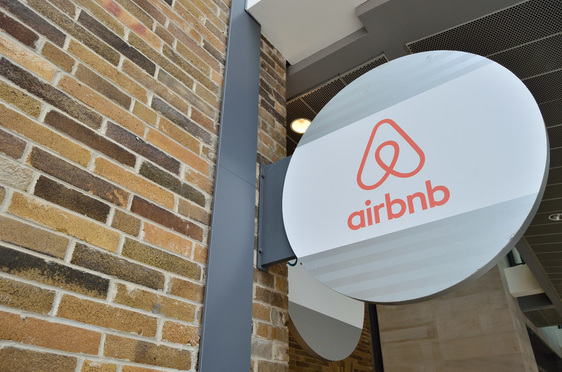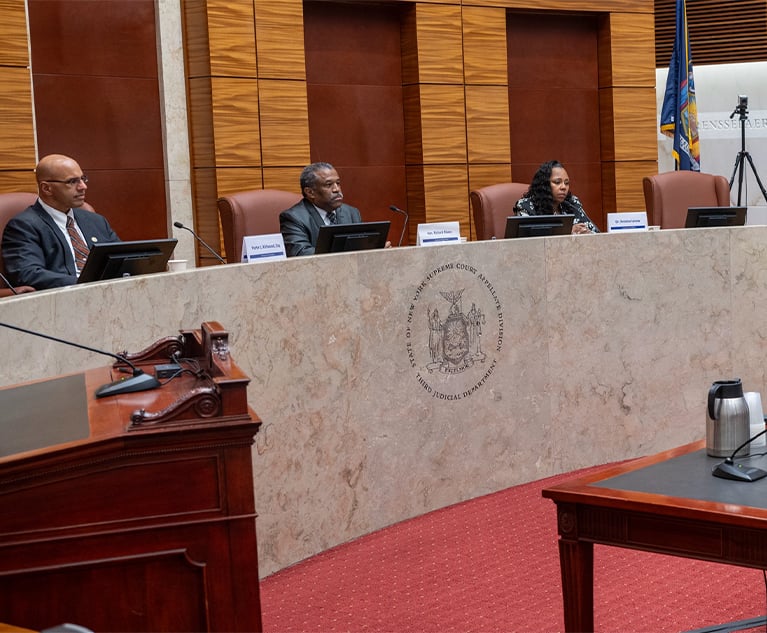Airbnb Says City Subpoena for Data Would Risk Privacy of Thousands
If New York City is given user data from the last seven years, the privacy of scores of hosts and thousands of guests will be compromised, lawyers for Airbnb have argued in opposition to the broad subpoena sought by the city government.
July 30, 2018 at 06:22 PM
4 minute read
 If New York City is given user data from the last seven years, the privacy of scores of hosts and thousands of guests will be compromised, lawyers for Airbnb have argued in opposition to the broad subpoena sought by the city government. Airbnb's bid to foil the subpoena is the latest step in the legal fight between city officials and the home-sharing tech company. Airbnb target of a lawsuit In papers filed on Sunday, Airbnb argues that the wording of the city's subpoena commands that it produce information “well beyond” what it needs to pursue its case against Big Apple—the city's demand affects 76 accounts used to list properties on Airbnb and potentially thousands of guests who were hosted through the accounts, it argues, while only seven are relevant to the suit. “Requesting 'utterly irrelevant' data on the 69 accounts not implicated in the city's lawsuit—and particularly data on the 49 hosts with little to no Airbnb activity at these properties—goes far beyond the pleadings in the case, is irrelevant to the city's claim and improperly seeks to amass data on New Yorkers who had nothing to do with the alleged illegal activities,” the papers state. New York law does not allow for such “fishing expeditions,” the company argues, and the city filed the suit “as soon as possible to garner press attention.” Airbnb is represented in the matter by Nicholas Jackson and Jacob Sommer of ZwillGen. In a written statement, the Office of Special Enforcement said that platforms like Airbnb are witnesses in its investigation into Big Apple and that “witnesses are required to cooperate with subpoenas. “These platforms hold critical information about activity a landlord allowed to flourish in rent-stabilized buildings, jeopardizing some of our most important affordable housing stock and endangering New Yorkers and visitors,” said Christian Klossner, the executive director of the Office of Special Enforcement. “Despite the platform's promise to combat bad actors and despite having provided this information in the past, OSE has been forced to seek the court's assistance to gain compliance from these platforms that have a legal obligation to release the data.” Since 2010, it has been illegal under New York state law to rent out dwellings in multi-family buildings in New York City for less than 30 days, which effectively outlaws Airbnb in much of the city; in recent months, the city appears to have gotten more aggressive in its approach to Airbnb and its hosts. In June, the city filed suit against Big Apple, arguing that it is entitled to $1 million in punitive damages. This month, the city filed suits against Airbnb and TripAdvisor in Manhattan Supreme Court in the days after the New York City Council passed a bill requiring Airbnb to turn over the names and addresses of its hosts, arguing that the companies had yet to comply with subpoenas served as part of the case against Big Apple. In one of the suits, the city says it's operating under a “clear public mandate” to put a stop to attempts to convert permanent residencies into “ersatz” hotels, which it argues reduces the city's housing stock and jeopardizes the safety of New Yorkers and Airbnb guests. On the same day the council passed the legislation with a veto-proof majority, an Airbnb host who testified before the council against the city's stepped-up enforcement tactics on Airbnb hosts filed suit against the city alleging that he was hit with $32,000 in fines just for speaking out. Airbnb retained Andrew Celli Jr. of Emery Celli Brinckerhoff & Abady to represent Stanley Karol, the plaintiff in the retaliation suit.
If New York City is given user data from the last seven years, the privacy of scores of hosts and thousands of guests will be compromised, lawyers for Airbnb have argued in opposition to the broad subpoena sought by the city government. Airbnb's bid to foil the subpoena is the latest step in the legal fight between city officials and the home-sharing tech company. Airbnb target of a lawsuit In papers filed on Sunday, Airbnb argues that the wording of the city's subpoena commands that it produce information “well beyond” what it needs to pursue its case against Big Apple—the city's demand affects 76 accounts used to list properties on Airbnb and potentially thousands of guests who were hosted through the accounts, it argues, while only seven are relevant to the suit. “Requesting 'utterly irrelevant' data on the 69 accounts not implicated in the city's lawsuit—and particularly data on the 49 hosts with little to no Airbnb activity at these properties—goes far beyond the pleadings in the case, is irrelevant to the city's claim and improperly seeks to amass data on New Yorkers who had nothing to do with the alleged illegal activities,” the papers state. New York law does not allow for such “fishing expeditions,” the company argues, and the city filed the suit “as soon as possible to garner press attention.” Airbnb is represented in the matter by Nicholas Jackson and Jacob Sommer of ZwillGen. In a written statement, the Office of Special Enforcement said that platforms like Airbnb are witnesses in its investigation into Big Apple and that “witnesses are required to cooperate with subpoenas. “These platforms hold critical information about activity a landlord allowed to flourish in rent-stabilized buildings, jeopardizing some of our most important affordable housing stock and endangering New Yorkers and visitors,” said Christian Klossner, the executive director of the Office of Special Enforcement. “Despite the platform's promise to combat bad actors and despite having provided this information in the past, OSE has been forced to seek the court's assistance to gain compliance from these platforms that have a legal obligation to release the data.” Since 2010, it has been illegal under New York state law to rent out dwellings in multi-family buildings in New York City for less than 30 days, which effectively outlaws Airbnb in much of the city; in recent months, the city appears to have gotten more aggressive in its approach to Airbnb and its hosts. In June, the city filed suit against Big Apple, arguing that it is entitled to $1 million in punitive damages. This month, the city filed suits against Airbnb and TripAdvisor in Manhattan Supreme Court in the days after the New York City Council passed a bill requiring Airbnb to turn over the names and addresses of its hosts, arguing that the companies had yet to comply with subpoenas served as part of the case against Big Apple. In one of the suits, the city says it's operating under a “clear public mandate” to put a stop to attempts to convert permanent residencies into “ersatz” hotels, which it argues reduces the city's housing stock and jeopardizes the safety of New Yorkers and Airbnb guests. On the same day the council passed the legislation with a veto-proof majority, an Airbnb host who testified before the council against the city's stepped-up enforcement tactics on Airbnb hosts filed suit against the city alleging that he was hit with $32,000 in fines just for speaking out. Airbnb retained Andrew Celli Jr. of Emery Celli Brinckerhoff & Abady to represent Stanley Karol, the plaintiff in the retaliation suit.This content has been archived. It is available through our partners, LexisNexis® and Bloomberg Law.
To view this content, please continue to their sites.
Not a Lexis Subscriber?
Subscribe Now
Not a Bloomberg Law Subscriber?
Subscribe Now
NOT FOR REPRINT
© 2025 ALM Global, LLC, All Rights Reserved. Request academic re-use from www.copyright.com. All other uses, submit a request to [email protected]. For more information visit Asset & Logo Licensing.
You Might Like
View All

Law Firms Expand Scope of Immigration Expertise Amid Blitz of Trump Orders
6 minute read
'Reluctant to Trust'?: NY Courts Continue to Grapple With Complexities of Jury Diversity
Trending Stories
- 1Uber Files RICO Suit Against Plaintiff-Side Firms Alleging Fraudulent Injury Claims
- 2The Law Firm Disrupted: Scrutinizing the Elephant More Than the Mouse
- 3Inherent Diminished Value Damages Unavailable to 3rd-Party Claimants, Court Says
- 4Pa. Defense Firm Sued by Client Over Ex-Eagles Player's $43.5M Med Mal Win
- 5Losses Mount at Morris Manning, but Departing Ex-Chair Stays Bullish About His Old Firm's Future
Who Got The Work
J. Brugh Lower of Gibbons has entered an appearance for industrial equipment supplier Devco Corporation in a pending trademark infringement lawsuit. The suit, accusing the defendant of selling knock-off Graco products, was filed Dec. 18 in New Jersey District Court by Rivkin Radler on behalf of Graco Inc. and Graco Minnesota. The case, assigned to U.S. District Judge Zahid N. Quraishi, is 3:24-cv-11294, Graco Inc. et al v. Devco Corporation.
Who Got The Work
Rebecca Maller-Stein and Kent A. Yalowitz of Arnold & Porter Kaye Scholer have entered their appearances for Hanaco Venture Capital and its executives, Lior Prosor and David Frankel, in a pending securities lawsuit. The action, filed on Dec. 24 in New York Southern District Court by Zell, Aron & Co. on behalf of Goldeneye Advisors, accuses the defendants of negligently and fraudulently managing the plaintiff's $1 million investment. The case, assigned to U.S. District Judge Vernon S. Broderick, is 1:24-cv-09918, Goldeneye Advisors, LLC v. Hanaco Venture Capital, Ltd. et al.
Who Got The Work
Attorneys from A&O Shearman has stepped in as defense counsel for Toronto-Dominion Bank and other defendants in a pending securities class action. The suit, filed Dec. 11 in New York Southern District Court by Bleichmar Fonti & Auld, accuses the defendants of concealing the bank's 'pervasive' deficiencies in regards to its compliance with the Bank Secrecy Act and the quality of its anti-money laundering controls. The case, assigned to U.S. District Judge Arun Subramanian, is 1:24-cv-09445, Gonzalez v. The Toronto-Dominion Bank et al.
Who Got The Work
Crown Castle International, a Pennsylvania company providing shared communications infrastructure, has turned to Luke D. Wolf of Gordon Rees Scully Mansukhani to fend off a pending breach-of-contract lawsuit. The court action, filed Nov. 25 in Michigan Eastern District Court by Hooper Hathaway PC on behalf of The Town Residences LLC, accuses Crown Castle of failing to transfer approximately $30,000 in utility payments from T-Mobile in breach of a roof-top lease and assignment agreement. The case, assigned to U.S. District Judge Susan K. Declercq, is 2:24-cv-13131, The Town Residences LLC v. T-Mobile US, Inc. et al.
Who Got The Work
Wilfred P. Coronato and Daniel M. Schwartz of McCarter & English have stepped in as defense counsel to Electrolux Home Products Inc. in a pending product liability lawsuit. The court action, filed Nov. 26 in New York Eastern District Court by Poulos Lopiccolo PC and Nagel Rice LLP on behalf of David Stern, alleges that the defendant's refrigerators’ drawers and shelving repeatedly break and fall apart within months after purchase. The case, assigned to U.S. District Judge Joan M. Azrack, is 2:24-cv-08204, Stern v. Electrolux Home Products, Inc.
Featured Firms
Law Offices of Gary Martin Hays & Associates, P.C.
(470) 294-1674
Law Offices of Mark E. Salomone
(857) 444-6468
Smith & Hassler
(713) 739-1250







